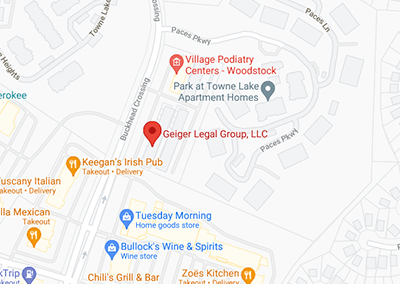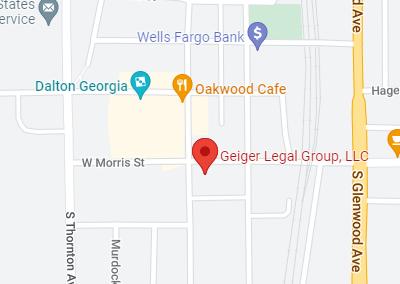Elopement in Canton Nursing Homes

Elopement is when a nursing home resident leaves a facility without supervision. This puts the resident’s safety at risk and can be particularly dangerous for elderly individuals who may have cognitive impairments or conditions like Alzheimer’s disease.
When you place your loved one in a Canton, GA nursing home or other long-term care facility, you expect the facility’s staff, doctors, and nurses to keep your loved one safe by taking every necessary precaution. Unfortunately, many Georgia nursing homes choose to put profits over patient safety, which often means a lack of quality care. Many nursing homes are understaffed and the staff who do work there are underpaid and overworked.
When nursing home staff do not provide adequate supervision, it puts residents at risk. Elopement is just one example of what can happen when a nursing home lacks the necessary protocols and sufficient staff to supervise and care for all the residents.
What is Wandering?
While wandering and elopement are related, they are distinct behaviors. Wandering refers to aimless, repetitive movements within a confined space, while elopement involves a resident leaving a nursing home or other long-term care facility without supervision. Understanding this difference is crucial for identifying and addressing the specific risks associated with each behavior. Wandering may lead to elopement.
Reasons Behind Wandering:
Nursing home residents may wander for various reasons, including:
- Memory Disorders: Residents with conditions like Alzheimer’s or dementia may wander due to memory loss and confusion.
- Restlessness: Some residents may wander out of restlessness or boredom, seeking stimulation or a change of scenery.
- Disorientation: Changes in the environment, especially during nighttime, can lead to disorientation and wandering.
Other reasons for wandering might include:
- Sickness/Illness
- Changes in medication
- Being overly medicated
- Sleep disorders
- A desire to visit loved ones.
Types of Wandering:
Wandering can manifest in different ways, such as:
- Aimless Wandering: Residents may wander without a specific destination or purpose due to agitation, boredom, confusion, or because they are uncomfortable.
- Agitated Wandering: Some residents may wander due to anxiety or agitation.
- Responsive Wandering: Residents may be responding to a specific need, such as searching for a restroom or food. Responsive or purposeful wondering has intent behind it. A resident may be trying to find a nurse or return home to their loved ones.
Determining the motivation behind a resident’s wandering helps nursing home staff to categorize the behavior. This helps staff in creating a plan of care to keep the resident safe. The nursing home is responsible for providing each resident with a suitable plan of care to prevent or at least, minimize wandering. Because wandering may lead to elopement, it’s important for nursing home staff to create a plan. When elopement occurs, it is likely due to neglect.
Dangers Associated with Elopement
Elopement poses significant dangers to nursing home residents, including:
- Exposure to Harsh Weather: Residents who elope may face extreme weather conditions, leading to hypothermia or heat-related illnesses.
- Traffic Hazards: Elopement can result in residents wandering into traffic, leading to accidents and severe injuries or death.
- Physical Strain: Residents may experience physical exhaustion or other injuries during elopement.
Common Injuries from elopement may include:
- Fractures and broken bones
- Dehydration
- Exposure-related illnesses
- Malnutrition
- Dehydration
- Drowning
- Injuries from a lack of proper medications such as a stroke or heart attack
- Traumatic brain injury
- Lacerations
- Death
Elopement injuries can have severe consequences, affecting the overall health and well-being of a nursing home resident.
Preventing Elopement
To address the problem of elopement, nursing homes should implement various preventive measures to protect residents. Below are examples of important actions that nursing homes should take to keep residents safe.
- Increased Staffing: Adequate staffing levels ensure proper monitoring and supervision of residents.
- Security Measures: Implementing secure entry and exit points, as well as using technology like alarms and tracking devices, can help prevent elopement.
- Staff Training: Providing staff with specialized training in dealing with residents prone to wandering or elopement is crucial for early identification and intervention.
- Individualized Care Plans: Tailoring care plans to the specific needs and risks of each resident can help mitigate the likelihood of elopement.
Other safety measures might include:
- Incorporating a circular floor plan
- Implementing video surveillance at doors and exits
- Maintaining strict records
- Changing door codes regularly
- Using sufficient lighting inside and outside the facility
- Appointing extra supervision for residents who are prone to wander or are more at risk of eloping.
How Can a Canton Nursing Home Abuse Attorney Help Me?
Elopement in Canton nursing homes is a significant issue that requires attention and proactive measures. By understanding the contributing factors, dangers, and preventive strategies associated with elopement, the healthcare industry can work towards creating safer environments for vulnerable elderly residents. Addressing elopement is not only a matter of physical safety but it’s an ethical responsibility to provide the highest quality of care to those who live at a nursing home facility.
If your loved one has been injured because of nursing home elopement or wandering, we can help. We work tirelessly to help clients hold the correct people responsible when neglect or abuse leads to serious injuries or death. Contact us today to set up a free consultation. Call us at 770-343-5380 or fill out our contact form below for a free case review.




























